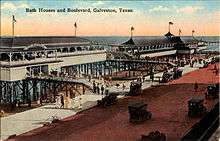Seawall Boulevard
Seawall Boulevard is a major road in Galveston, Texas in the United States. The boulevard is conterminous with Farm to Market Road 3005 south of 61st Street. It runs along the Gulf coast waterfront of the island near the main parts of the city. It is named for the Galveston Seawall built along the beaches. The sidewalk adjacent to Seawall Boulevard on the south is claimed to be the longest continuous sidewalk in the world at 10.3 miles (16.6 km) long.[1]
Seawall Boulevard is home to several hotels and entertainment venues including the famous Hotel Galvez.
In 2011 a voter referendum which passed by the Seawall Enhancement Campaign led to a creation of a parking management district where motorists who park on Seawall Boulevard would pay up to $8 per day or $25 annually where revenue from paid parking is used for Seawall enhancements. Paid parking is waived on the Fourth of July, Mardi Gras, and the Lone Star Rally but due to the budget shortfall of the first six months of the Seawall Enhancement Campaign parking revenues are still collected despite the provisions stated during the 2011 election. A sunset clause which was part of the 2011 referendum eliminates paid parking after 7 years of service. Paid seawall parking was phased in since July 11, 2013 which is slated to expire July 11, 2020 where a continuation of the Seawall Enhancement Campaign after the 7-year contract requires another voter referendum to be placed on the May 2020 voter ballot for the City of Galveston municipal elections.
Open Era
During Galveston's Open Era the road became quite famous as a lavish, nationally known tourist venue and casino district featuring elegant hotels and clubs. The boulevard's prominence began with the construction of the club and casino Maceo's Grotto (later called the Balinese Room) in 1929.[2] Other famous locations on this road included Murdoch's Bath House, the Buccaneer Hotel, the Pleasure Pier, and the Mountain Speedway roller coaster.[3]


The boulevard became the focal point for tourism events such as the International Pageant of Pulchritude of the 1920s, the first international beauty contest.[4][5][6] The event would be held on the beach in front of the seawall attracting tourists from around the nation and media attention from around the world. Other events along the boulevard included the spectacular Mardi Gras parade and celebration.
This era of prosperity declined during the 1940s and ended in the 1950s with the closing of the casinos by the Texas Rangers.[7]
Notes
- ↑ Galveston, Texas Outdoor Recreation & Nature Accessed 2012-03-15.
- ↑ Miller (1993), pg. 6
Cartwright (1998), pg. 9 - ↑ Cartwright (1998), pg. 194
Miller (1993), pg. 185 - ↑ Stein, Elissa (2006). Beauty Queen: Here She Comes... Chronicle Books. p. 37. ISBN 978-0-8118-4864-0.
- ↑ "Miss United States Began In Galveston". The Islander Magazine. 2006.
- ↑ Cherry, Bill (25 October 2004). "Miss America was once Pageant of Pulchritude". Galveston Daily News.
- ↑ Cartwright, Gary (June 1993). "One Last Shot". Texas Monthly.
Further reading
- Cartwright, Gary (1998). Galveston: a history of the island. TCU Press. p. 9. ISBN 978-0-87565-190-3.
- Miller, Ray (1993). Ray Miller's Galveston. Gulf Publishing. p. 6. ISBN 978-0-88415-091-6.
- Baird, David; Peterson, Eric; Schlecht, Neil E. (2007). Frommer's Texas. Frommer's. ISBN 978-0-470-08298-0.